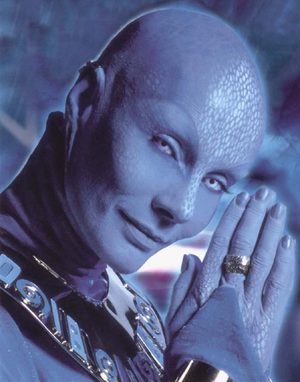Any particular reason why the mainstream media is showing us the photographic self-portraits of a mass murderer, depicting him as some kind of kick-ass comrade of Neo and Trinity aboard the Nebuchadnezzar?
Oh, we all know why you do it
Sometimes you even slow it down
You’re giving out some bad ideas here
I can’t believe that you don’t realize
You must be evil
You must be evil
Evil…
— Chris Rea, "You Must Be Evil"
Hats off to the local English media, which has thus far declined to be the propaganda organs of a publicity-hungry killer.
POSTSCRIPT: Jim Treacher at the Daily Gut expresses irritation with some of the reaction:
According to MSNBC: "South Korea’s Foreign Ministry expressed its condolences, saying that there was no known motive for the shootings and that South Korea hoped the tragedy would not ‘stir up racial prejudice or confrontation.’ " You know what? How about just expressing your condolences? If a white American guy shot a bunch of people in South Korea, would we tell the grieving families that we hoped it wouldn’t stir up racial prejudice?
On a personal note, I’ve been approached by a couple of Taiwanese within the last few days and asked if I know how to distinguish between Taiwanese and Koreans. I admit I probably can’t, though I make sure to ask the questioners in turn if THEY can tell the difference between Frenchmen and Poles.
I tell them that I can’t, either. But most people ARE able to distinguish between dead homicidal maniacs and people who, by a sheer accident of birth, happen to share the same nationality.
CORRECTION: It was Jim Treacher and not David Gutfeld at the Daily Gut who was unhappy about the South Korean government’s initial response to the Cho Seung-Hui shootings. Apologies for that; the error has been corrected.
UPDATE: Maybe I should have read today’s papers before writing this post, because two local English papers DID print Cho’s pictures. The Taiwan News printed the one with Cho raising a claw hammer with two hands – which isn’t that objectionable because it just makes him look demented. Taiwan’s China Post on the other hand, printed the one where Cho looks like an Asian gangsta-rap version of the Shadow. Fortunate that they’re not trying to glamorize him, or anything…
Meanwhile, a couple of lawmakers with mental-health issues of their own showed up at Virginia Tech’s sister university in Taipei with the local media in tow, and staged an impromptu terrorism drill by reporting a false hostage-taking incident to police. Needless to say, much hilarity ensued:
At a classroom where students were studying, [one of the Taiwanese nationalist lawmakers] walked in and held up a fork, saying it was a submachine gun, and pointed it at the students while asking them if they knew how to deal with such a situation.
Several minutes later, the legislative duo [and class-full of students] were confronted by dozens of police officers wearing bullet-proof vests and carrying 9mm pistols and M-16 assault rifles, who had been sent from nearby Daan Precinct.
Teach-errr, can we do the midterm NEXT week, instead?
Closing this little round-up, it looks like the Taiwanese who talked to me aren’t the only ones concerned about being mistaken for Koreans:
…some Taiwanese students in the US had asked Taiwanese compatriot organizations or their families to send them clothes or hats with the word "Taiwan" or "Taipei" or stickers of the national flag in a bid to help distinguish them from South Korean nationals after Monday’s killings.
I don’t mean to belittle other people’s concerns or fears, but I don’t for a minute believe Southerners are going to lynch ANYBODY over this. Frankly, I think it’s a little little insulting to suggest that they might.
UPDATE (Apr 21/07): The View from Taiwan has a more in-depth discussion of the phony terrorism drill at National Taiwan University in Taipei.
UPDATE (May 15/07): South Korean newspapers apparently indulged in some schadenfreude immediately after the killings, printing editorial cartoons slamming American society. After learning that the shooter was Korean, however, they quickly pulled the cartoons. (Hat tip to AsiaPundit)
